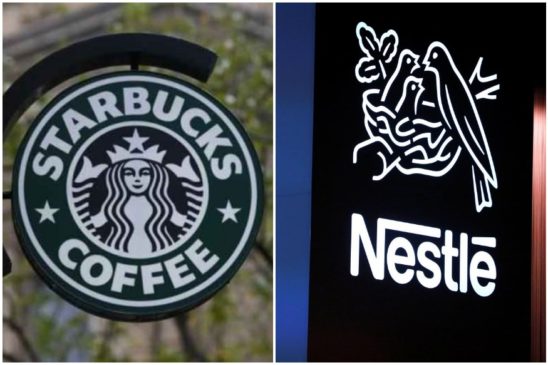
Swiss food giant Nestle on May 7 announced that it will pay USD 7.15 billion in cash for the rights to market Starbucks products around the world, outside of the company’s coffee shops.
As part of this transaction, Starbucks will receive an up-front cash payment of USD 7.15 billion for a business which generated annual sales of USD 2 billion. The transaction does not include the transfer of any fixed assets, which facilitates a smooth and efficient integration.
This transaction provides Nestlé with a strong platform for continued growth in North America with leadership positions in the premium roast, ground and portioned coffee businesses. It also allows Nestlé to capture new growth opportunities in the rest of the world with Starbucks premium products.
A good model of brand licensing. Here’s how?
Nestlé will serve as a powerhouse foodservice product provider that is in need of a strong premium brand name in a competitive growing market. Whereas, on the other hand, Starbucks has established brand loyalty and reinvented the coffee business across the United States.
Grocery retail is a different approach for the Starbucks brand. However, Nestle as a brand, has already has the distribution networks in place at retail. Nestlé understands the grocery and foodservice business better than most.
Starbucks is facing the challenge of dwindling sales at its core coffee shops. Through the licensing of the Starbucks brand to the foodservice business, it enables Starbucks to focus its attention on reviving its core business, while giving Starbucks a significant infusion of capital from Nestlé along with a long-term stream of royalty payments.
Effect on the Wall Street?
Starbucks shares fell 23 cents to $57.45 on Monday, and are down about 3% in the past year. Nestlé shares rose 1.6% on Monday.
Seattle-based Starbucks, the world’s biggest coffee chain, said it will use proceeds to speed-up share buybacks and the deal would add to earnings per share (EPS) by 2021. In a separate statement, Nestle said it expected the business to contribute positively to its earnings per share and organic growth targets from 2019.
Starbucks – Nestle Deal: A look from both the companies’ perspective?
According to Euromonitor International, the transaction will strengthen Nestle’s position in the United States, where it is only the No. 5 player with less than 5 percent of the market. Market leader Starbucks itself only has a 14 per cent share.
Nestlé hopes more coffee sales can offset flagging sales of some of its other packaged-food businesses. As part of the agreement, Nestlé will add Starbucks Reserve, Seattle’s Best Coffee and Teavana to a portfolio that includes the Nescafé and Nespresso brands. Nestlé will also now manage the business of distributing Starbucks K-Cups, the single-serve coffee pods used in Keurig brewers in North America.
Companies that were once all-powerful in their particular market segment are learning that through licensing partnerships, they can capture greater market share.
What does the deal mean in the long-term?
The consumers (young coffee addict generation) that they are trying to reach through Nestlé are very likely to drive increased sales for both businesses and they will both make money from it.
During the recent course of time, we are seeing a lot of big retail brands being picked off by smaller competitors who have less resources but who are telling their story more effectively directly to consumers via social media.
With two large, strong units now controlling the distribution of Starbucks and the presentation of its brand around the world, will they speak with one consistent brand voice? Or, will they reduce the meaningfulness of the brand value? Only time will tell.
Only just a day passed after the official announcement, it is hard to predict the long-term. However, in the short-term, it will definitely increase earnings.
Expert speak….
“Nestle is far and away the largest hot drinks company globally, with more in sales than the next five largest hot drinks companies combined,” Matthew Barry, an analyst at Euromonitor said on Friday when the tie-up was first proposed. “However, Nestle’s leadership position is less secure than it once was,” Barry further stated.
The agreement announced on Monday could revive up Starbucks’ roughly $2 billion business selling packaged Starbucks coffee, Teavana tea and other products through grocery stores and other retailers, including in China.
The alliance, which amounts to a licensing arrangement, frees Seattle-based Starbucks to focus on improving its mainstay U.S. cafe business, where traffic growth has stalled amid competition from fast-food chains and upscale coffee houses, while rapidly adding shops in China.
As part of this perpetual global license agreement, Starbucks will lead in sourcing, roasting and Starbucks global brand management for the alliance, while the two companies will work closely together on innovation and go-to-market strategies to bring the best coffee to customers around the world.
The agreement excludes ready-to-drink coffee, tea and juice products.
The transaction, which needs approval from regulators, should be finalized by the end of 2018, Nestle said, adding that the deal should start making a positive contribution to its earnings per share and its growth targets starting next year.




[…] Nestlé has closed the deal granting it access to perpetual global rights to market Starbucks good and products around the globe. […]